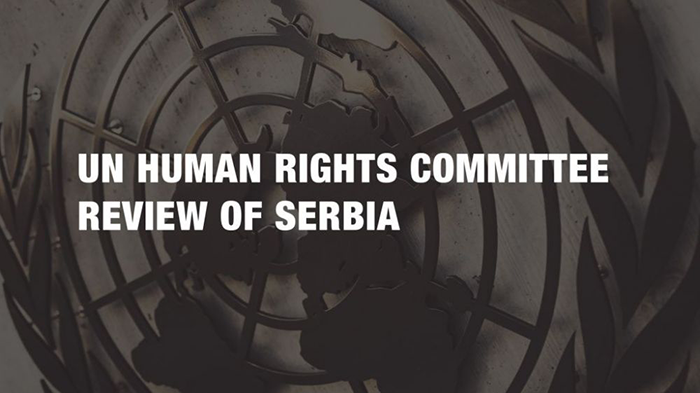UN Human Rights Committee recently published Concluding observations on the third periodic report of Serbia and made recommendations related to the implementation of the International Covenant on Civil and Political Rights. Prior to 119th Session of the Committee in March 2017, the Belgrade Centre for Human Rights and Lawyers’ Committee for Human Rights (YUCOM) submitted a joint report to the Committee intended for additional information on the implementation of respective provisions of the Covenant, describing inter alia problems faced by refugees and asylum seekers in Serbia. In its Concluding observations, Committee likewise paid special attention to the situation of migrants and asylum seekers, and expressed concern for delays in the adoption of the draft law on free legal aid.
Committee acknowledged the current challenges regarding refugees and appreciating the basis legal protection in place, at the same time expressing concerns about the existence of significant obstacles and delays in the process of registering, interviewing and providing identification for asylum seekers and the low number of asylum claims granted, as well as the number of reported cases of efforts to deny access to Serbian territory and asylum procedures, of collective and violent expulsions and of the misapplication of the “safe third country” principle, despite concerns regarding conditions in some of those countries. Committee is also concerned of the fact that unaccompanied and separated children do not have adequate access to guardians, that there are inadequate procedures for age determination in place, and that these children are residing in the same facilities as adults.
With the aim of eliminate these deficiencies, in line with its international and national obligations, Serbia was addressed with the recommendation to ensure that access to formal procedures for asylum applications is available at all parts of the territory, notably in international airports and transit zones, and that all persons engaging directly with refugees or migrants are appropriately trained. Secondly, it is necessary to ensure that all asylum applications are assessed promptly on an individual basis with full respect for the principle of non-refoulement and that decisions of denial can be challenged through suspensive proceedings. Third, Serbia should refrain from collective expulsion of aliens and ensure an objective assessment of the level of protection when expelling aliens to “safe third countries” and receive guarantees from relevant authorities that the alien will be admitted to the asylum procedure and provided with basic rights. Fourth, Committee’s recommendation is that both inside and outside reception centres should meet adequate conditions for all refugees and asylum seekers. And fifth, it is necessary to ensure that appropriate protocols are in place for identifying the age of unaccompanied minors and ensuring that they receive appropriate guardianship and treatment that takes into account the principle of the best interests of the child.
